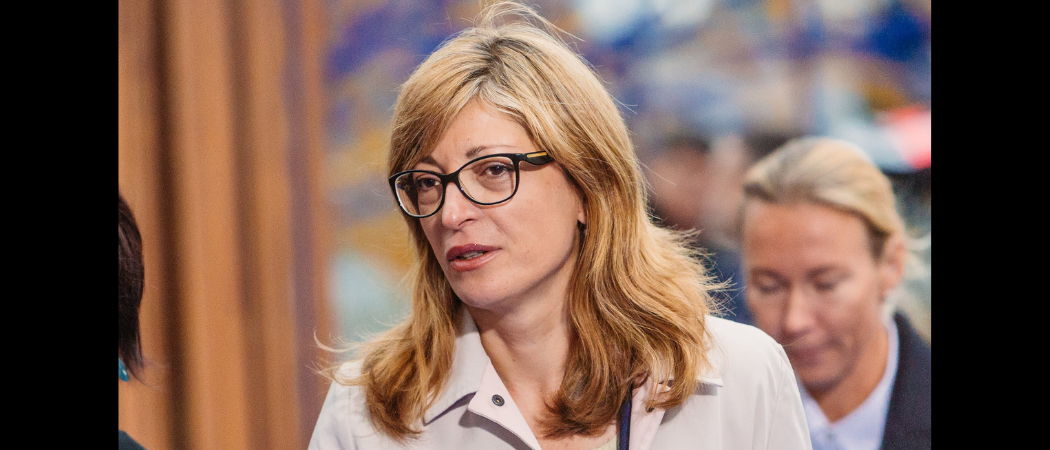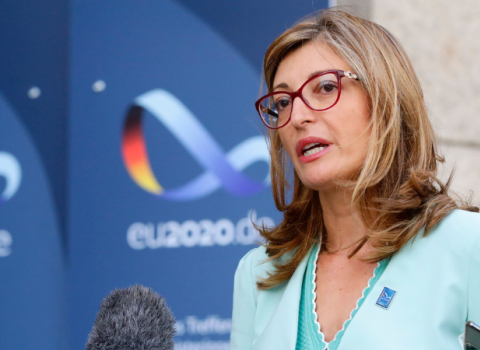She will steer through new acts on innovation and the European Research Area. But splitting off education has some worried

Newly appointed research commissioner Ekaterina Zaharieva. Photo credits: Arno Mikkor (EU2017EE) / Flickr
Bulgarian Ekaterina Zaharieva has been unveiled as the new commissioner for start-ups, research and innovation, after returning Commission president Ursula von der Leyen doled out top jobs and mandates this morning.
Part of Zaharieva’s role will be to implement many of the recent recommendations from former Italian prime ministers Enrico Letta and Mario Draghi, who delivered stark warnings about Europe’s failure to keep up with global competition.
However, the absence of education within Zaharieva’s revamped portfolio has worried universities, which fear that splitting the mandate could risk disjointed policy. Meanwhile, adding responsibility for start-ups to the R&I portfolio is a first for any commissioner.
Unveiling her team this morning, von der Leyen namechecked research and innovation early on.
“We must put research and innovation, science and technology at the centre of our economy. [Zaharieva] will help ensure that we invest more and focus our spending on strategic priorities and on groundbreaking innovation,” she said.
Despite the rhetoric, von der Leyen’s mission letters to commissioners, have no mention of Draghi’s top research recommendation - that the EU create its own disruptive innovation agency along the lines of the Defense Advanced Research Projects Agency.
Instead, Zaharieva will “work to expand the European Innovation Council (EIC) and the European Research Council (ERC)”, as already promised in the returning president’s political mandate.
The Bulgarian will also propose a European Research Area act to finally tackle fragmentation and ensure that research and innovation becomes the ‘fifth freedom’ of the EU single market, as Letta’s high-level report urged.
There’s also a promise to introduce a European Innovation act to smooth regulations and allow companies better access to venture capital.
Zaharieva, a lawyer, whose main background is in foreign policy, is “an experienced politician with, however, little experience in the field of science and innovation,” said Robert-Jan Smits, president of the executive board of the Eindhoven University of Technology and former director general of research and innovation at the European Commission.
“The specific mention of start-ups in her function is good news for the EIC and shows that the recommendations of Draghi are taken seriously by von der Leyen. The same holds for Zaharieva’s mission letter which starts with mentioning Europe’s competitiveness as a clear goal for the EU research and innovation policy,” Smits said.
Supporting industry
The mission letter also says Zaharieva will lead work on a strategy for European life sciences and an EU biotech act.
She will help to set up a European artificial intelligence research council, which von der Leyen pledged in her political guidelines ahead of her re-election for a second mandate, building on calls for a ‘CERN for AI’, modelled on the nuclear research institute in Geneva.
However, the letter suggests this new AI body will be more narrowly focused on the “uptake of AI by European scientists”, rather than a more expansive organisation using AI across the board. Some European AI experts want a much broader body.
Zaharieva’s other missions include developing a long-term strategy to create a pan-European ecosystem of research infrastructures; strengthening university alliances; and contributing to reinforcing international research cooperation and security.
Research and education split
Universities, however, are likely to be disappointed that research and education are split, having been in the same portfolio in the outgoing commission.
The commissioner for education is to be Roxana Mînzatu, whose job title is executive vice president for people, skills and preparedness. The Romanian commissioner’s portfolio includes responsibility for skills, education and culture, quality jobs and social rights.
“Where is higher education exactly between the two commissioners? We would really have liked to have that clearly together with research,” said Thomas Jørgensen, director for policy coordination and foresight at the European University Association.
“As soon as you have things that touch universities, if you separate research and education, it becomes difficult,” he said.
Jørgensen is also worried that adding start-ups to Zaharieva’s R&I portfolio signals research is being instrumentalised, and only valued insofar as it contributes to commercialisation and economic growth. “We’re not just an instrument for something else,” he warned.
Similarly, Mattias Björnmalm, secretary general of the university association CESAER, said it is crucial that research and innovation remain under a single portfolio, but the absence of education is “a missed opportunity, as research, education, and innovation together form the knowledge triangle,” he said.
Kurt Deketelaere, secretary general of the League of European Research Universities, said it is a “pity” that education has been split from research and innovation, but he noted that all six executive vice presidents have clear links with research, innovation and education policy.
Education subsumed
Mînzatu’s duties will include working on the European Education Area to support a common approach to skills; the European Degree announced in March; attracting skilled workers from outside the EU; and a new STEM Education Strategic Plan.
The fact that education is not in Mînzatu’s job title is concerning for some.
“It is regrettable that the concept of ‘education’ disappears from the title of the portfolio of executive vice president Roxana Minzatu, although we can still hope that in the confirmation hearings process there is an opportunity the concept could come back,” said Emmanuelle Gardan, director of the Coimbra group of universities, adding, “There is a clear shift of focus from education, to skills in the mission letter as well”.
Executive vice presidents
See the bird's eye view of who will do what in the new Commission.
Above Zaharieva, there’s the question of whether Henna Virkkunen, the Finnish executive vice president for tech sovereignty, security and democracy will get involved in the research agenda.
Virkkunen, who as an MEP was involved in the design of Horizon Europe, could take an interest, although with such a broad brief, it’s unclear whether it will be a priority.
She has backed pledges by von der Leyen to spend more on research, and expand the ERC and EIC.
Björnmalm welcomed the focus on technology, people and skills in the executive vice-president roles. “Advanced technology, and the cutting-edge science and talent that underpins it, is vital to Europe’s future prosperity and competitiveness,” he said.
Zaharieva will report both to Virkkunen, and the French executive vice president responsible for prosperity and industrial strategy, Stéphane Séjourné.
Where’s FP10?
Some observers have raised an eyebrow that Zaharieva’s mission letter fails to mention preparing for FP10, the research programme that should succeed Horizon Europe in 2028.
This will feed anxieties that the Commission’s budget directorate has designs to subsume the framework programme into a broader competitiveness fund, come the next multiannual financial framework in 2028.
Particularly in Pillar II of the research programme, which funds industrial and academic consortia, this could mean redirecting funds away from research and instead towards the broader development and rollout of strategic technologies – although for now, this is little more than Brussels speculation.
"Although I understand the ‘political’ wish to simplify, streamline and create scale and scope by having fewer programmes, it will undoubtedly put science and innovation in a subordinate position which could undermine its specificities and way of functioning,” said Smits.
It would be a “shock” if the framework programmes disappeared into a broader construction, said Deketelaere, an EU law expert. But EU treaties create “no real obligations” to include research framework programmes, he said.
However, mission letters to Zaharieva’s predecessors in 2014 and 2019 also don’t mention planning for the next framework programme, so the omission of FP10 this time around could signal little.
Another Bulgarian
If confirmed, Zaharieva will become the third consecutive Bulgarian research and innovation commissioner, after Mariya Gabriel and Iliana Ivanova.
Congratulating her likely successor, Ivanova said Zaharieva had been “entrusted with one of the most important strategic portfolios in the future European Commission”.
“This is a recognition of her competence and qualities, as well as Bulgaria's achievements and contribution in this field. I wish her every success and I am convinced that with her experience and European commitment we will have a worthy representative of Bulgaria in the European Commission,” Ivanova said.
The commissioner nominees must still be quizzed by MEPs in the relevant committees, before being confirmed in a vote by the European Parliament this autumn. There are currently no confirmed dates for the hearings.






 A unique international forum for public research organisations and companies to connect their external engagement with strategic interests around their R&D system.
A unique international forum for public research organisations and companies to connect their external engagement with strategic interests around their R&D system.